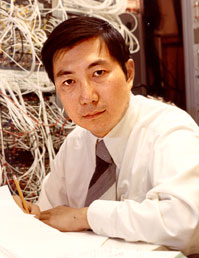Samuel C. C. Ting
| Samuel Chao Chung Ting | |
 |
|
| Born | January 27, 1936 Ann Arbor, Michigan, USA |
|---|---|
| Nationality | United States |
| Fields | Physics |
| Institutions | CERN Columbia University MIT |
| Alma mater | University of Michigan |
| Doctoral advisor | L.W. Jones, M.L. Perl |
| Known for | Discovery of the J/ψ particle |
| Notable awards | Nobel Prize for Physics (1976) Ernest Orlando Lawrence Award (1976) De Gasperi Award (1988) |
Samuel Chao Chung Ting (Chinese: 丁肇中; pinyin: Dīng Zhàozhōng; Wade-Giles: Ting¹ Chao⁴-chung¹) (born January 27, 1936) is an American physicist who received the Nobel Prize in 1976, with Burton Richter, for discovering the subatomic J/ψ particle.
Contents |
Biography
Ting's ancestry is Rizhao (日照縣), Shandong, on mainland China. His parents, Kuan-hai Ting (丁觀海) and Tsun-ying Jeanne Wang (王雋英), met as graduate students in Michigan and moved back to the warring China when Samuel Ting was an infant. As a result, Samuel Ting's formal childhood education had been discontinuous and sporadic, and he was mostly home-schooled by his parents, who later became professors of science and psychology, respectively, at National Taiwan University in Taipei, Taiwan. His formal education began at twelve at the prestigious Provincial Chien-Kuo High School (建國中學, now Municipal Taipei Chien-Kuo Senior High School) in Taipei. After high school, he studied one year at National Cheng Kung University, Tainan City.
When Ting returned to the United States in his twenties, he studied engineering, mathematics and physics at the University of Michigan. In 1959 he was awarded BSEs in both mathematics and physics, and in 1962 he earned a doctorate in physics. In 1963 he worked at the European Organization for Nuclear Research, which would later become CERN. From 1965 he taught at Columbia University, and worked at the Deutsches Elektronen-Synchrotron (DESY) in Germany. Since 1969 Ting has been a professor at the Massachusetts Institute of Technology (MIT).
Ting gave his Nobel Prize acceptance speech in Mandarin. Although there had been Chinese recipients before (Tsung-Dao Lee and Chen Ning Yang), none had previously delivered the acceptance speech in Chinese. In his speech, Ting emphasized that the importance of experimental work equals that of theoretical work.
In 1995, not long after the cancellation of the Superconducting Super Collider project had severely reduced the possibilities for experimental high-energy physics on earth, Ting proposed the Alpha Magnetic Spectrometer, a space-borne cosmic-ray detector. He has since been directing the work on what the New York Times has called "one of the most expensive scientific experiments ever built," with costs of US$1.5 billion as of 2007.[1]
Ting is a member of the U.S. National Academy of Sciences, an academician of the Chinese Academy of Sciences, and an academician of Taiwan's Academia Sinica.
Private life
In 1960 Ting married Kay Kuhne, and together have two daughters, Jeanne and Amy. Since 1985 he has been married to Dr. Susan Carol Marks, and they have one son, Christopher, who is currently a consultant at Booz Allen Hamilton in Washington, DC.
See also
- MIT Physics Department
- List of independent discoveries
References
- ↑ Dennis Overbye: Long-Awaited Cosmic-Ray Detector May Be Shelved. The New York Times, April 3, 2007
External links
|
||||||||
| Persondata | |
|---|---|
| NAME | Ting, Samuel Chao Chung |
| ALTERNATIVE NAMES | |
| SHORT DESCRIPTION | Physicist |
| DATE OF BIRTH | 27 January 1936 |
| PLACE OF BIRTH | Ann Arbor, Michigan |
| DATE OF DEATH | |
| PLACE OF DEATH | |